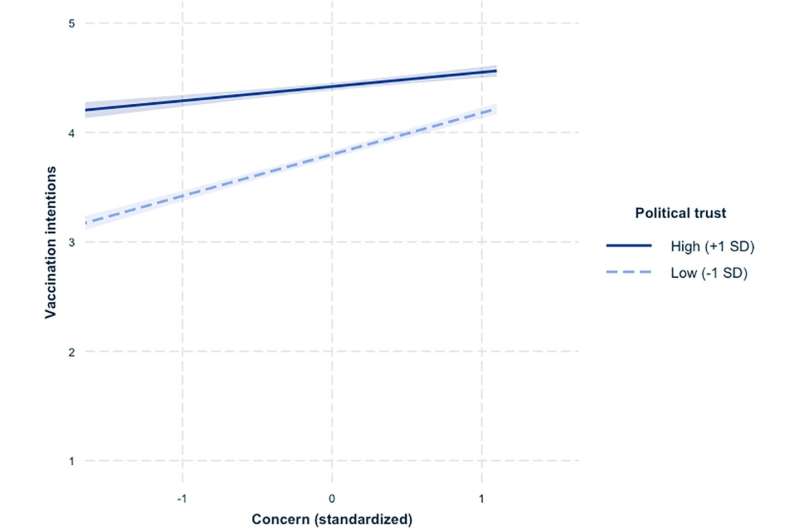Vaccination intentions as a function of concern and political trust (higher scores represent greater vaccination intentions) in Study 1. Credit: Political Psychology (2022). DOI: 10.1111/pops.12871
With a return to the workplace and school, the UK Health Security Agency recently warned that cases of flu and COVID-19 are expected to soar throughout January. Currently, it is estimated that one in eight NHS beds are taken up by flu and COVID-19 patients—yet 22 million vaccines for these viruses have not been used.
A new paper, looking at the psychological reasons for people's unwillingness to accept the COVID-19 vaccine, reveals two key factors to be people's lack of concern for the consequences of contracting the virus together with their lack of faith in the government's actions. The study is published in the journal Political Psychology.
Since the outbreak of the coronavirus pandemic in 2020, substantial efforts have been directed toward the development of effective vaccines.
The success of national vaccination campaigns is considered central to finally containing the virus and finding a way out of the pandemic. Yet, as seen this January with 9 million people who are still due to take a COVID-19 booster jab, and 13 million unused free flu shots, vaccine efficacy and safety are not enough to determine the success of these campaigns—vaccine acceptance among the public is also key. This is why it is so crucial to understand psychological reasons for vaccine hesitancy.
The study, conducted by Professor Dominic Abrams from the School of Psychology at the University of Kent, and Dr. Fanny Lalot (University of Kent and University of Basel), tested the theory that COVID-19 vaccine hesitancy is a result of 'distrustful complacency'—a dangerous combination of low concern and low trust.
The psychologists hypothesized that either concern or political trust should be sufficient to motivate people to get vaccinated, as the presence of one can compensate for the absence of the other. The absence of both concern and trust, however, "distrustful complacency," would undermine that motivation, resulting in greater vaccine hesitancy.
Across two studies, 9,695 respondents from different parts of Britain reported their level of concern about COVID-19, their trust in the UK government, and their intention to accept or refuse the vaccine. Across the studies, respondents with both low trust and low concern were 26%–29% more hesitant to receive the vaccine, compared to those with both high trust and high concern.
The study showed that people who accept the vaccine do so because they are highly concerned about the consequences of the pandemic—for themselves and for others. Others do so because they trust the political institutions responsible for enacting the vaccination program. However, those who, for whatever reasons, do not trust these institutions and are also not concerned about the virus are much likelier to be hesitant about vaccination.
Professor Abrams said, "Vaccines save lives but only if people are willing to take them. Our evidence shows that science and politics are powerfully interconnected. For scientific knowledge to make its contribution, people need to trust that politicians are using the evidence and advising wisely."
Dr. Lalot added, "The importance of finding the same connection between trust, concern and vaccination intentions amongst White British, Muslim, and Black respondents, and generally across all nations in Britain. This underlines the importance of psychological perceptions regardless of demographic factors."
More information: Fanny Lalot et al, Distrustful Complacency and the COVID ‐19 Vaccine: How Concern and Political Trust Interact to Affect Vaccine Hesitancy, Political Psychology (2022). DOI: 10.1111/pops.12871
Provided by University of Kent
























